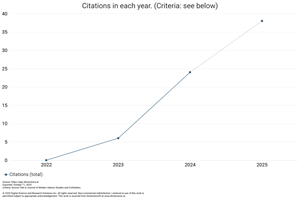An Ethnolinguistic Approach for Criticizing Indonesian Interpretations of the Quran
DOI:
https://doi.org/10.59653/jmisc.v2i03.960Keywords:
Selected:Ethnolinguistics, Tafsir Al-Quran, Cultural Tafsir, Lay InterpretationAbstract
Understanding the holy texts, such as the Quran, requires interpretation. As a means of communication between readers and texts, interpretation is tied to language and culture. To understand the Indonesian interpretation of the Quran, this paper proposes an ethnolinguistic approach. There are two important questions about the position of this approach in research on the interpretation of the Quran in Indonesia and the appropriate research design for this purpose. By using de-contextualization and re-contextualization techniques in library research and meta-analysis techniques, the author succeeded in formulating an ethnolinguistic approach that offers linguistic analysis of interpretation in its cultural context. This allows us to understand the nuances of meaning and the social implications of interpretation. Ethnolinguistic research can help identify cultural and ideological biases in interpretation that open up new interpretive possibilities. This paper discusses appropriate research designs for applying an ethnolinguistic approach to the interpretation of the Quran in Indonesia. Research designs must consider Indonesia’s diverse cultural and linguistic contexts, as well as appropriate data collection and analysis methods. Ethnolinguistic research on the interpretation of the Quran in Indonesia has the potential to make an important contribution to a better understanding of Islam in Indonesia, and its relationship to local culture and language.
Downloads
References
Abdullah, M. (2022). Islam nusantara: Tracing the traces of kh sholeh darat thought in pesantren literature. E3S Web of Conferences, 359. https://doi.org/10.1051/e3sconf/202235906003
Abdullah, M., Thohir, M., & Rukiyah. (2021). The Arom of Islamization of Java in The Literature of Pesantren: Study of The Rahman Faithur Book by K.H. Sholeh Darat. E3S Web of Conferences, 317. https://doi.org/10.1051/e3sconf/202131703008
Abdurrahman. (2019). Hermeneutika Inklusif Abu Zayd (1st ed.). Pioner Semesta.
Abdurrahman. (2024). Metode Penelitian Kepustakaan dalam Pendidikan Islam. Adabuna : Jurnal Pendidikan Dan Pemikiran, 3(2), 102–113.
Arrasyid, A., Markos, T., & Aqilah, S. (2023). Concepts of Translation of Takwil, Tafsir, and Hermeneutics in the Science of the Al-Qur’an. Jurnal Kawakib, 4(1). https://doi.org/10.24036/kwkib.v4i1.130
Az-Zarqani, M. A. A. (n.d.). Manahil Al-Irfan fi Ulum Al-Quran (3rd ed.). Mathba’ah Isa Al-Babi Al-Halabi.
Bert, P. (2017). APPLIED ETHNOLINGUISTICS Is Cultural Linguistics, but Is it CULTURAL LINGUISTICS? International Journal “Speech Genres,” 15(1). https://doi.org/10.18500/2311-0740-2017-1-15-37-50
Elmubarok, Zaim, D. Q. (2020). Bahasa Arab Pegon Sebagai Tradisi Pemahaman Agama Islam Di Pesisir Jawa. Lisanul’ Arab: Journal of Arabic Learning and Teaching, 9(1).
Engchuan, K. (2023). What’s in a Name? An Ethnosemantic Study of Muslim Mosque Names in Southern Thailand. Theory and Practice in Language Studies, 13(2). https://doi.org/10.17507/tpls.1302.20
Görke, A., & Pink, J. (2014). Redefining the Borders of Tafsir: Oral Exegesis, Lay Exegesis and Regional Particularities. In A. Görke (Ed.), Tafsir and Islamic Intellectual History Exploring the Boundaries of a Genre. Oxford University Press.
Helvi Kyngäs. (2020). Inductive Content Analysis. In The Application of Content Analysis in Nursing Science Research. Springer Nature Switzerland AG. https://doi.org/10.1007/978-3-030-30199-6
Hidayani, F. (2020). Paleografi Aksara Pegon. Jurnal Tamaddun : Jurnal Sejarah Dan Kebudayaan Islam, 8(2). https://doi.org/10.24235/tamaddun.v8i2.7241
Jamallullail, S. H., & Nordin, S. M. (2023). Ethnolinguistics Vitality Theory: The Last Stance for a Language Survival. Sustainable Multilingualism, 22(1). https://doi.org/10.2478/sm-2023-0002
Jonwari, & Faiz Zainuddin. (2020). Konsep Tafsir dan Takwil dalam Prespektif As-Syatibi. LISAN AL-HAL: Jurnal Pengembangan Pemikiran Dan Kebudayaan, 14(2). https://doi.org/10.35316/lisanalhal.v14i2.791
Laili, E. N. (2020). Pendidikan Karakter dan Anti-Radikalisme dalam Leksikon Kepesantrenan: Telaah Etnolinguistik. LPPM UNHASY Tebuireng Jombang. https://eprints.unhasy.ac.id/126/1/BUKU%20PENDIDIKAN%20KARAKTER%3B%20ETNOLINGUISTIK.pdf
Laili, E. N., & Herwiana, S. (2019). An Ethnosemantic Study on Pesantren Lexicon as An Effort for Cultivating Character Education. MABASAN, 13(2). https://doi.org/10.26499/mab.v13i2.261
Lindgren, B. M., Lundman, B., & Graneheim, U. H. (2020). Abstraction and interpretation during the qualitative content analysis process. In International Journal of Nursing Studies (Vol. 108). https://doi.org/10.1016/j.ijnurstu.2020.103632
Mahzumi, F. (2017). Literasi Pesantren di Bumi Ken Dhedes: Pelestarian Pegon Jawi sebagai Warisan Satar Islam Nusantara. International Conference on Muslim Society and Thought “Muslim Society and Globalization,” October 2017.
Qadafy, M. Z. (2019). Qur’anic exegesis for commoners: A thematic sketch of non-academic tafsīr works in Indonesia. Studia Islamika, 26(2). https://doi.org/10.15408/sdi.v26i2.8144
Rahman, A. (2019). Literatur Tafsir Al-Qur’an dalam Bahasa Melayu-Jawi. SUHUF, 12(1). https://doi.org/10.22548/shf.v12i1.445
Rusdi, M. (2024). Menteri Keuangan Kutip Ayat Al-Quran Saat Jadi Saksi Sidang Sengketa Pilpres di MK. Warta Kota Production. https://www.youtube.com/watch?v=7iEpp2e3A_w
Sa’adah, N. (2019). Problematika Pembelajaran Nahwu bagi Tingkat Pemula menggunakan Arab Pegon. Lisanan Arabiya: Jurnal Pendidikan Bahasa Arab, 3(01). https://doi.org/10.32699/liar.v3i01.995
Syafruddin, D. (1994). The Principles of Ibn Taymiyya’s Qur’anic Interpretation [Thesis, McGill University]. https://escholarship.mcgill.ca/concern/theses/qf85nd12p
Wahyuni, S., & Ibrahim, R. (2017). Pemaknaan Jawa Pegon dalam Memahami Kitab Kuning di Pesantren. Manarul Qur’an: Jurnal Ilmiah Studi Islam, 17(1). https://doi.org/10.32699/mq.v17i1.920
Wardani, & Mahfuz, T. W. (2022). Perkembangan Tafsir Al-Qur’an di Indonesia dan Malaysia: Menelusuri Akar Historis dan Dinamika Kontemporer. Zahir Publishing.
Wasiuta, S. (2023). Etnolingwistyka kognitywna – w stronę integralnego opisu języka. LingVaria, 18(2(36)). https://doi.org/10.12797/lv.18.2023.36.17
Wijaya, A. (2011). Hermeneutika Al-Qur’an: Memburu Pesan Manusiawi dalam Al-Qur’an. Ulumuna, 15(2). https://doi.org/10.20414/ujis.v15i2.196
Downloads
Published
How to Cite
Issue
Section
License
Copyright (c) 2024 Abdurrahman, Akh Fahrur Rozi

This work is licensed under a Creative Commons Attribution-ShareAlike 4.0 International License.
Authors who publish with this journal agree to the following terms:
- Authors retain copyright and grant the journal right of first publication with the work simultaneously licensed under a Creative Commons Attribution-ShareAlike that allows others to share the work with an acknowledgement of the work's authorship and initial publication in this journal.
- Authors are able to enter into separate, additional contractual arrangements for the non-exclusive distribution of the journal's published version of the work (e.g., post it to an institutional repository or publish it in a book), with an acknowledgement of its initial publication in this journal.
- Authors are permitted and encouraged to post their work online (e.g., in institutional repositories or on their website) prior to and during the submission process, as it can lead to productive exchanges, as well as earlier and greater citation of published work (See The Effect of Open Access).
























